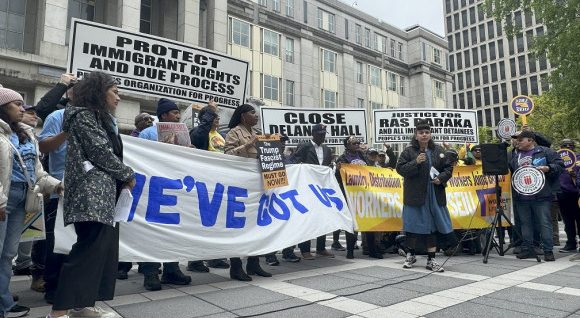
New York: News and Analysis from WBAI’s We Decide: America at the Crossroads with Jenna Flanagan – Listen Here
Canadian wildfire smoke is degrading ambient air quality across much of the northern Plains states, the Great Lakes region, the mid-Atlantic, and the American Northeast into New England. Local health officials warn the fine particulates could irritate the eyes, nose, and throat, causing respiratory and coronary distress—particularly for those with pre-existing conditions.
In international news, the BBC is reporting that the release of video showing starving Israeli hostages held by the Palestinian Islamic Jihad in Gaza is prompting condemnation from Western leaders. Hamas’s military wing denied Israeli government claims that it was starving hostages taken on Oct. 7th, noting that captives are surviving on the same rations Hamas fighters are barely subsisting on.
Meanwhile, protests continue to grow in Israel against the Netanyahu government. The Hamas-run health ministry in Gaza reports 175 people, including 93 children, have died of malnutrition since the war began following Hamas’s Oct. 7th attack that killed 1,200 people, mostly civilians.
Al Jazeera reports that more than 60,000 Palestinians have been killed as a result of the 21-month Israeli military operation. Some experts believe the true number is much higher.
Back in February, President Trump called for the U.S. to take over Gaza and convert it into a resort—a gross violation of international law on multiple levels.
According to the New York Times, major news organizations around the world are calling on Israel to lift restrictions on humanitarian aid entering Gaza and on the movement of reporters in and out of the region, as Palestinian journalists struggle to survive.
The war in Gaza has claimed the lives of over 230 journalists—making it the deadliest armed conflict for media workers, according to the Watson Institute for International and Public Affairs’ Cost of War Project at Brown University.
In this episode of We Decide: America at the Crossroads, we begin with our weekly reporters’ roundtable featuring Laura Jedeed, a freelance journalist based in New York City whose work has appeared in Politico, Rolling Stone, and The New Republic. She tracks the MAGA movement.
This week she is joined by Maeve Conran, Managing News Editor for Rocky Mountain Community Radio, part of the Pacifica Radio Network, which helps produce this program. Our panel discusses the essential role local community public radio plays in reporting on the climate crisis and the Trump administration’s controversial mass deportation strategy.
In the B Block, Jenna speaks with Nathan Gusdorf, Executive Director of the Fiscal Policy Institute, about the fallout from President Trump’s firing of the Department of Labor’s Bureau of Labor Statistics Commissioner Erika McEntarfer, following the release of job data he found unfavorable. Gusdorf explains why objective labor data is essential for policymakers and investors alike, and assesses the potential harm of Trump’s “Big Beautiful Budget” bill on the Main Street economy.
In the C Block, we explore the challenges state officials face when their communities are disrupted by federal immigration raids. Increasingly, these violent ICE operations target law-abiding residents—pillars of their communities—causing devastating family separations.
We hear from New York State Assemblyman Phil Steck and civil liberties attorney Norman Siegel about what’s happening on the ground and possible remedies to preserve local peace and stability.
We close with our weekly Pacifica Radio Network reporter’s notebook with Lisa Loving, our editor-at-large, and Ursula Ruttenberg, who oversees the affiliates program. This segment explores President Trump’s long-standing war on public media—targeted by the radical right since the 1960s—and the consequences of media consolidation, which has decimated local journalism across the country.
We hear from KGNU‘s Jack Armstrong in Boulder, Colorado, on how CPB cuts have impacted local public radio—especially in rural areas vulnerable to natural disasters.
Ursula Ruttenberg also interviews Randy Zimmerman, General Manager of Tampa’s WMNF, one of Pacifica’s largest affiliates. WMNF faced a “double whammy” after Gov. Ron DeSantis eliminated state funding for public media and the GOP Congress defunded CPB, cutting 11% of the station’s budget.
Zimmerman recounts how listeners across Florida and the nation rallied during a recent fund drive that raised over $300,000—though she admits the future remains uncertain.
This program is made possible thanks to contributions from unions representing 3 million households, including AFGE, SEIU 1199, 32BJ SEIU, and TWU of America.
